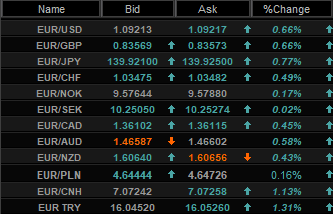Euro-Dollar Leads Euro Outperformance as ECB Sets 'Hawks' Among Pigeons
- Written by: James Skinner
-
- ECB policymakers open door for summer rate rise
- June’s forecasts key determinants of rate outlook
- EUR/USD rallies into test of resistance on charts

© European Central Bank, reproduced under CC licensing
The Euro to Dollar exchange rate led an outperforming European single currency complex higher in the penultimate session of the week after another European Central Bank (ECB) Governing Council member said there is a chance of a Eurozone interest rate rise this summer.
Europe’s single currency was the outperformer among G20 currency complex on Thursday after ECB Governing Council member Pierre Wunsch told Bloomberg News that calling time on the era of negative Eurozone interest rates this year could be “a no brainer.”
Wunsch, who is also Governor of the National Bank of Belgium, said that in the absence of an economic calamity in the Eurozone he would likely seek to raise the ECB’s deposit rate from -0.5% to zero percent or “or slightly positive territory” by year-end.
“Without any really bad news coming from that front, hiking by the end of this year to zero or slightly positive territory for me would be a no brainer,” ECB Governing Council member Pierre Wunsch told Bloomberg this Thursday.
Above: Selected Euro exchange rates and Thursday’s performances during the European morning. Click image for closer inspection.
Perhaps far more notable, however, were the remarks made on Wednesday by ECB Vice President Luis de Guindos given that Wunsch is known as something of a monetary policy ‘hawk’ while de Guindos is himself generally viewed as something of a ‘dove.’
“It will depend on the data we see in June. From today’s perspective, July is possible and September, or later, is also possible. We will look at the data and only then decide,” de Guindos said in an interview, also with Bloomberg News.
“Our rate-hike cycle will depend on the data. We will act depending on the evolution of inflation. We don’t face any restrictions in that respect. Inflation expectations and second-round effects are the main factors to look at when setting monetary policy,” de Guindos also said on Wednesday.
These latest remarks followed others from Martins Kazaks, head of the Latvian central bank and a member of the ECB’s policymaking Governing Council, who reportedly said on Wednesday that the ECB’s commitment to “gradualism” does not necessarily mean a slow response.
This week’s comments elaborate on the expanded guidance given by ECB President Christine Lagarde in April’s monetary policy press conference.
“Some time after” is intended to serve our determination to have both optionality, gradualism and flexibility, which means that this “some time after” can be anywhere between a week to several months. That stands and remains true,” President Lagarde said last Thursday.
This was after the ECB said in March that interest rates would be unlikely to rise until “some time after” the bank’s last remaining quantitative easing programme - known as the Asset Purchase Programme - is wound down.
This collection of remarks lifted the Euro-Dollar rate sharply on Thursday, leading the exchange rate to test a minor technical resistance level on the charts while also delivering a boost to other Euro exchange rates.
“Elsewhere, EUR/USD can continue to follow the USD moves across the board with further evidence that the recent rally of UST yields is coming off the boil likely to disadvantage the USD and give EUR/USD a boost,” says Valentin Marinov, head of FX strategy at Credit Agricole CIB.


